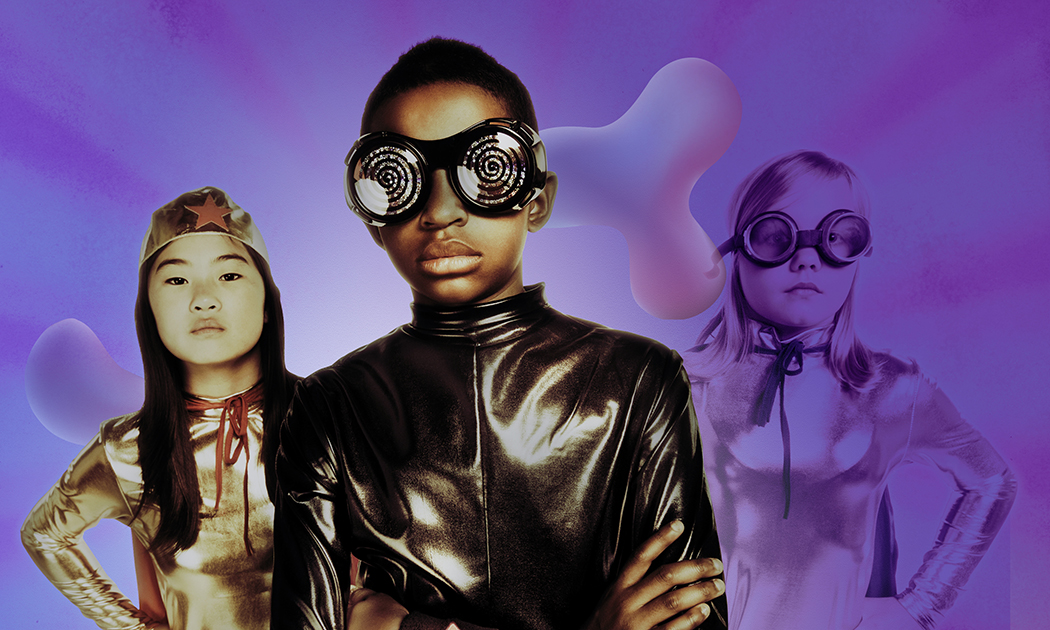In the year 2000, the dawn of the social media age, a video of a muscular man dancing at a parade became one of the first viral videos in the history of the internet.
In the 20 years since ‘The Techno Viking’, the landscape has drastically changed, and the Viking’s popularity is now just one of thousands of other memes and viral videos resigned to the depths of internet obscurity.
But, the Viking’s dance moves are regaining increasing popularity, and surprisingly, it’s the gaming industry who are responsible for it. Space Invaders, Mario, Warcraft, Grand Theft Auto (and many others) have changed the way we think of gaming and entertainment. However, not many games can claim to have been as commercially and culturally relevant as Fortnite.
Epic Games, the studio behind it, has been valued at more than $15 billion. Fortnite is now 200 million players strong, and Ninja (one of its pro-players) is the first gamer to appear on the cover of ESPN magazine. Fortnite’s relevancy is in part because it mirrors and enhances culture in terms of: how content is created, how media products are consumed in the era of cross device multi-tasking, and how a product’s value is defined in the experience economy (where experiences are as valuable as physical products).
As a cultural phenomenon, Fortnite’s success is partly due to its ability to recycle formats and content, and partly due to the fact it has tapped into a virtuous cycle of influence. It is a space where creators, fans and celebrities can meet, populating a creative and commercial bubble where Fortnite becomes more famous through celebrities, and celebrities gain more exposure through Fortnite.
Interestingly there are predictions that the Fortnite star is on the wane, with strong competitors such as Apex Legends hot on its coattails. However, it represents a clear example of new relevant cultural shifts with the power to disrupt the media and entertainment industry.
Brands and content creators can learn from Fortnite’s success, and use Fortnite as a window to spot relevant emerging trends which will impact how their audiences consume, create and share media products.
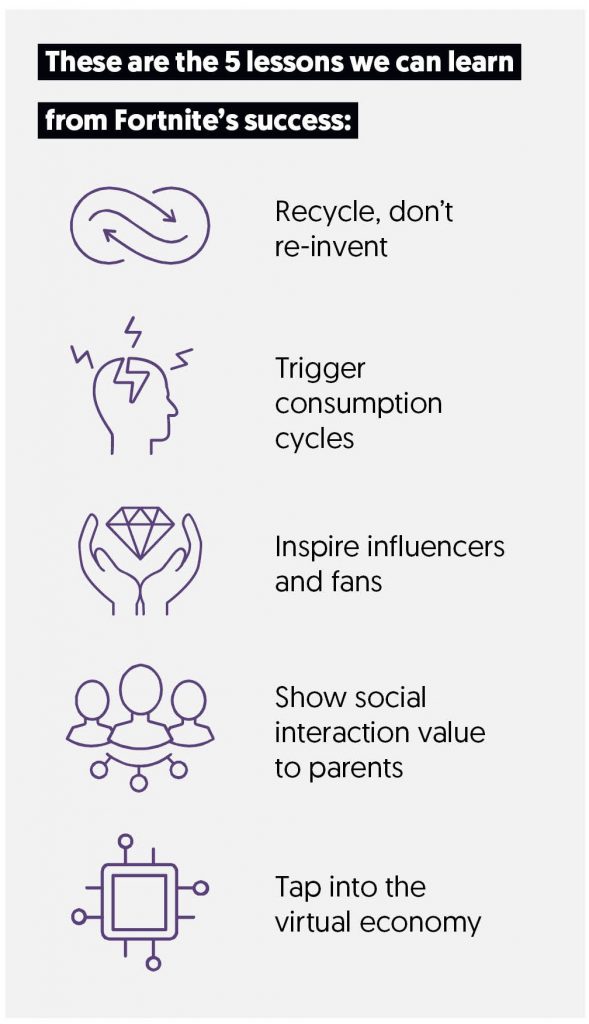
Fortnite is holistic. It merges the best ideas from its predecessors across cultures, to create a new, cohesive and complex product. At first glance and looking at its individual elements, Fortnite is not particularly new or ground breaking. Just like other games, Fortnite:
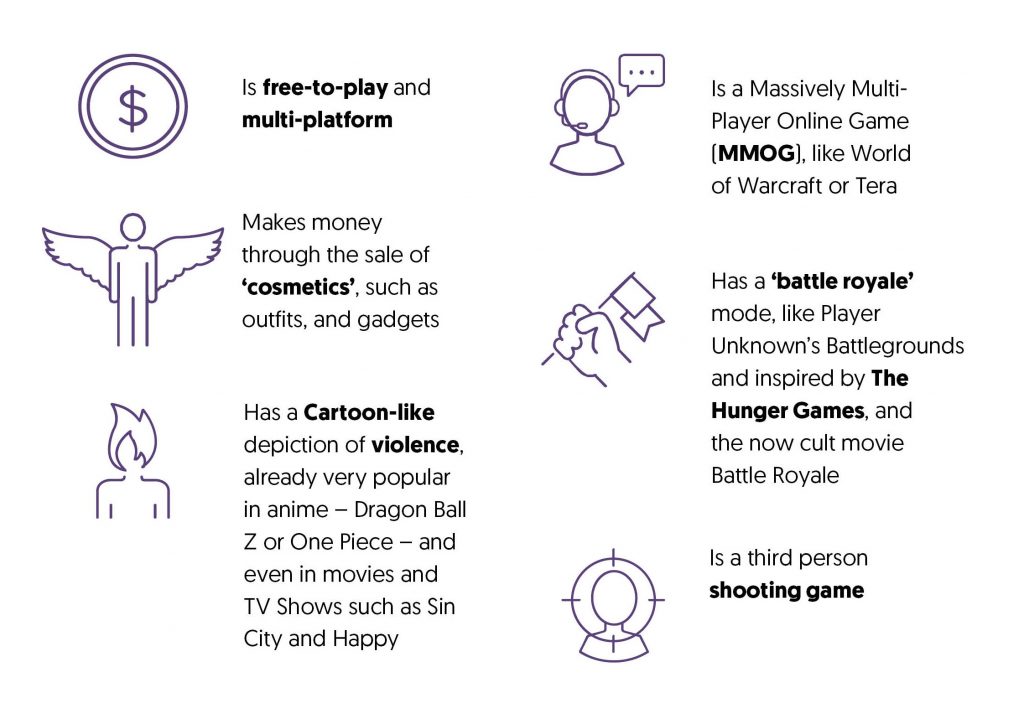
So, why is it so popular? Fortnite owes its success to its ability to merge all of these elements, in a holistic and integrated way, creating a final product which goes beyond the sum of its individual parts.
Its fragmented narrative is also inspired by popular TV content. The Fortnite story is so complex and narratively driven it could be mistaken for a season of Lost. Its universe is structured just like a seasonal TV show. With each new season comes new challenges, outfits, themes and cosmetics. The element most affected by the season renewals (and the true protagonist of the storyline) is the island itself. It is in constant flux and remains visibly marked by Fortnite’s evolution.
Fortnite also adopts a narrative structure which mirrors classic event TV content, which creates talking points and cultural moments which embed themselves in the social fabric of society. When players find themselves online during ‘events’ (like when the time space continuum broke and all characters were transported to a parallel universe) they describe it as a full and meaningful experience.
Players who have ‘lived’ through the many changes of the island describe themselves as experienced, separating them from new players (noobs). By establishing hierarchies, players are more invested in the game and motivated to play which, in turn, prompts them to invest more in their character.
By doing this, it creates an immersive experience in constant expansion. Fortnite’s cultural references span from ‘70s disco to Tarantino’s movies, from ‘90s sitcoms to viral memes. This is probably best demonstrated by its emotes – the funny dances characters can do inside the game.
Fortnite absorbs, recycles and refreshes pop and online cultures
Some of the Fortnite dances are original, but the most talked about are inspired by other popular pieces of content, such as Saturday Night Fever, The Fresh Prince of Bel Air, Pulp Fiction and viral videos like the Backpack Kid (the boy who brought flossing to the mainstream).
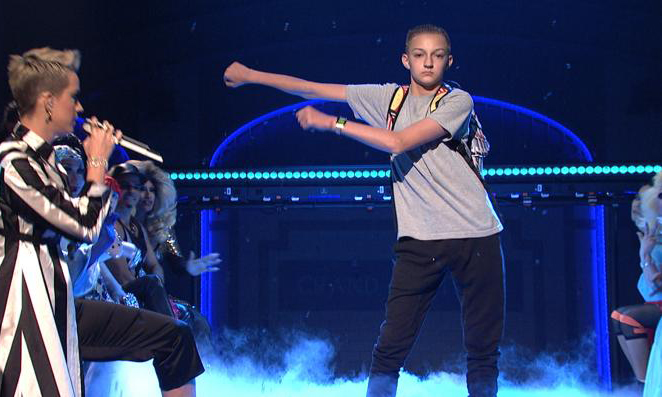
Image source: www.tes.com/news/fortniteclassroom-
floss-dance-craze-sweeping-schools
Using pre-existing content without acknowledging or rewarding the authors has sparked questions on copyright and even accusations of cultural appropriation. Fortnite may be ‘ripping off’ original content, but crucially, it is also promoting its resurgence.
The pattern goes:
- The game copies a viral video move;
- Someone recognises it and creates a video/meme/article linking it to its original source (because few things make us feel better than telling others how well versed we are in internet culture!);
- Teens start watching the video and share it on social media.
Suddenly, content once confined to the depths of the internet, is viral again.
Let’s consider the case of a dance inspired by the movie Dumb & Dumber. The movie is pretty much unknown to Fortnite’s young audiences, but the many articles and YouTube videos about the move, have mentioned the original source time after time. This creates a link between the game and the movie and it is possible some kids would then decide to consume the original.
Furthermore, Fortnite is loved by celebrities who established a reciprocal relationship with the game. An example is when the superstar pro-gamer Ninja was joined by the rapper Drake in a match of Fortnite. The game was live streamed on Twitch and drew a record 635,000 concurrent viewers.
This relationship with celebrities also helps Fortnite reach new audiences and gain more popularity in the sport world, for example when the footballer Antoine Griezmann celebrated a goal by performing the Fortnite dance “Take the L” at the World Cup.
Potentially unbeknown to Griezmann, ‘Take the L’ was inspired by the 2017 remake of Stephen King’s IT. The dance journeyed from the film to Fortnite and then to football, weaving a complex cultural web along the way. Memes and gifs of Griezmann’s celebration spread across the internet. People began imitating the footballer, who was imitating a Fortnite cosmetic which was in fact inspired by a horror movie. It is possible that some of the Fortnite players might have ended up watching IT because of Fortnite, inverting the circle!
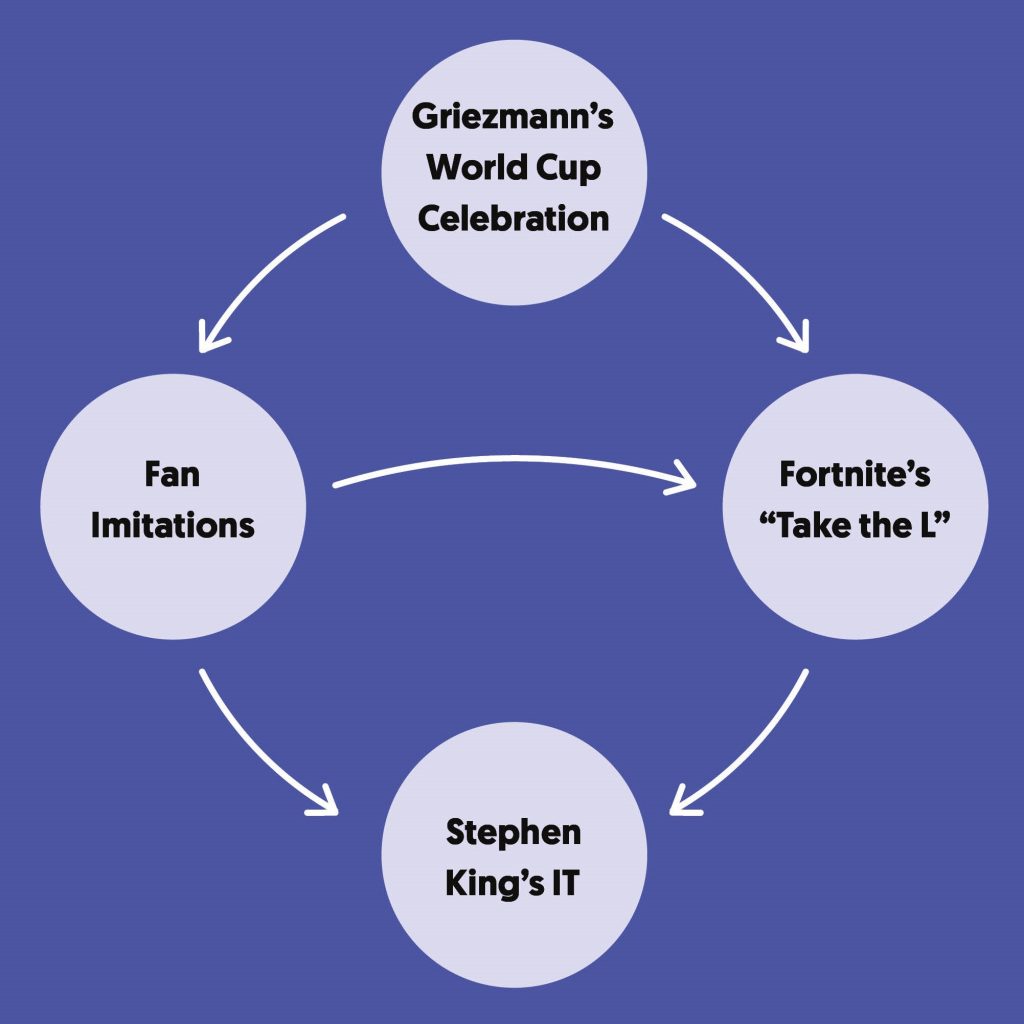
Drake is not the only celebrity in love with Fortnite. Sport celebrities like Julian Brandt and artists such as Finn Wolfhard are strengthening the ties between Fortnite and the sport and entertainment industries. With Ninja as an ESPN cover figure and the opening of the 100,000 sqft. E-sports Stadium in Arlington, the gaming and e-sport industry is set to sky-rocket.
At the same time, traditional and new media collide through Fortnite. The game is appreciated by other creators of pop culture such as movie directors and writers, giving birth to content cross overs like the successful Fortnite x Avengers: Infinity War mashup.
These relationships between Fortnite and its celebrity players offer a constant source of mutual inspiration, creating a posse not dissimilar from a creative group shaped around a popular artist.
Despite all the hype Fortnite has generated from celebrity fandom, it has remained grounded and user focused at its core. Users can get involved by offering feedback on ways to improve the game and with opportunities to be part of content creation, through dances competitions or skin designs. For example, the Tender Defender skin was added to the game’s wardrobe after an 8-year old’s drawing went viral.
Fortnite has been accused of being: addictive, violent, not safe for kids, and (amongst its adult players) a major cause for divorce. At the same time, the World Health Organisation (WHO) classified excessive gaming as a potential mental health issue, triggering polemics and discord in the gaming industry. But, what do Fortnite’s young players and their families think about the game? To understand this, we talked to British children and their families in collaboration with the ISFE (Interactive Software Federation of Europe).
The perception of Fortnite that emerged from our interviews was a much more positive one than that depicted by mainstream media. As opposed to making kids more insular, Fortnite actually increased social interaction with friends, both on and offline. It helped them develop team-working skills, and in some cases, replaced other insular behaviours, such as time spent on video streaming sites or playing on their own.
Parents’ concerns were mainly around time spent playing Fortnite and possible contact with strangers. However, being part of a generation who grew up with consoles, they recognised parallels between current critiques of Fortnite and those voiced about time spent watching TV and playing on their Atari 30 or 40 years ago.
On the other hand, parents would still like to have more control over the time and money their children spend online. It is clear there is little awareness about the ‘parental control’ tools already in place which enable parents to set time/spending limits, lock games deemed as not age appropriate, and limit in-game communication.
The industry does try to promote these tools to parents (either on a pan-European basis, through the PEGI age rating system or, with national campaigns like askaboutgames.com in the UK), however, there is still work to be done when designing communication and information resources which fit around parents’ busy lives and schedules.
“‘I’d rather buy my kids a new toy or pair of shoes than a skin on Fortnite!”
Parents are confused by an emerging trend involving the value of virtual purchases. They struggle to understand why their children want to spend an average of £30 on intangible outfits for their virtual characters, especially when considering that skins are purely aesthetic and make no difference to improving actual gameplay.
If we take a wider lens, it seems children’s preferences for virtual products is just a symptom of a broader cultural change. Western society is shifting towards virtuality and the experience economy and Fortnite’s popularity merely exemplifies it.
When children spend so much time in a virtual world, developing deep relationships with other inhabitants of the same immaterial community, virtual accessories and cosmetics gain a very similar value to their ‘real-life’ clothes or physical toys. In this scenario, virtual recognition, prestige and possessions communicate identity and status just as material goods do so in ‘real life’.
For the younger generation who grew up surrounded by social media and online personas, there is little difference between the value of physical and virtual possessions. A new skin carries the same cultural capital as the latest branded trainers.
Since its emergence, virtual has been considered the opposite of or alternative to ‘real’. However, this belief has been called into question with new technologies and societal changes. Virtual worlds are becoming an extension of our everyday realities. Fortnite shows us how our virtual experiences have consequences on our tangible world and vice-versa.
The borders between both realities are seemingly arbitrary when Griezmann goes viral doing a Fortnite dance at the World Cup and a skin designed on paper by a player is created into code. The shift towards virtuality is already showing its relevance in the music and entertainment industry, as showed by the Abba avatar tour project or DJ Marshmello’s set which (attended by millions on Fortnite) transformed the game into a music venue.
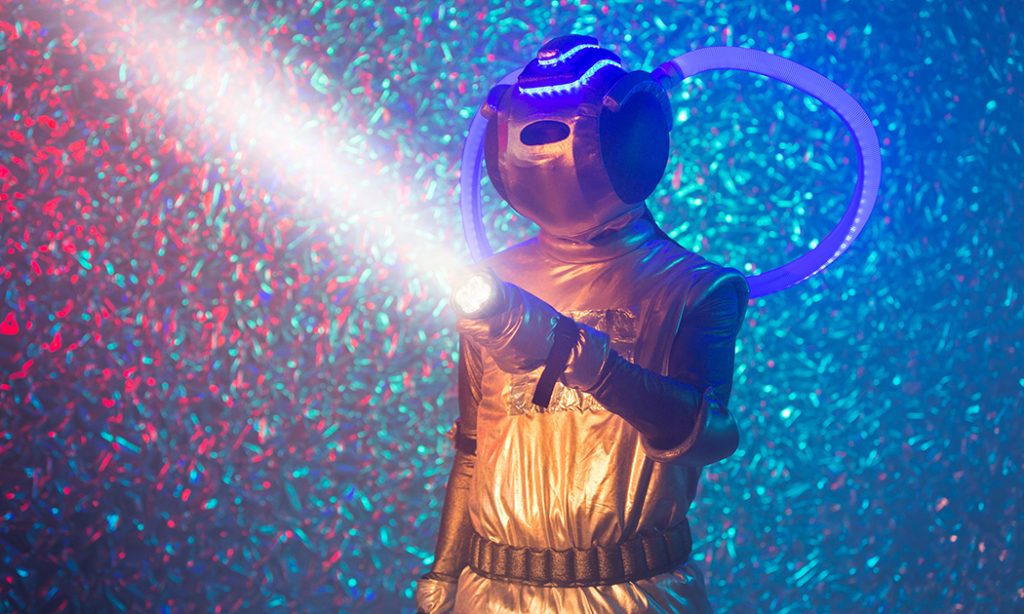
What does this mean for brands?
With 50% of the EU population now playing video games and with the cultural shifts towards virtuality and experience economy, comes great opportunities for brands and media.
Fortnite can inspire:
Content creators: developing new storytelling and characters. What could be the equivalent of Fortnite’s island in your content?
Online sellers: understanding the strategies and culture behind V-Bucks (in-game currency).
Media broadcasters: making the most out of cross-media experiences, understanding how to guide audiences’ consumption of your content across different platforms.
Entertainment industry: exploring the best way to recreate virtual events. How to recreate an event which is not just a virtual copy of the physical one, but makes the most out of the creative liberties offered by virtual reality?
Manufacturers: finding new ways to bridge the gap between a new generation focused on virtuality and an older generation’s need for tangibility. Could you deliver a tangible gadget with every virtual purchase?
Advertisers: looking for new and non-disruptive ways to assert a presence in these new virtual worlds. How could you populate the game without creating noise? How can you refer to Fortnite and other virtual worlds to add extra value to your products and services?
Sport industry: evaluating the impact of E-sports for younger generations. How can the Fortnite experience be translated from kids’ homes to stadiums? How can this be done for other games?
Gaming industry: understanding the needs, fears, and hopes of players and their families. How can you develop a product reconciling parents and kids’ needs?
Policy makers: to understand the value of the virtualisation of consumerism and the possible educational and entertainment opportunities represented by video games.
We don’t know how long this Fortnite phenomenon will last, but what we do know is that it represents a new way of influencing the media industry and culture at large.

